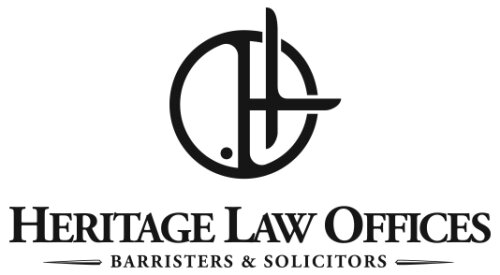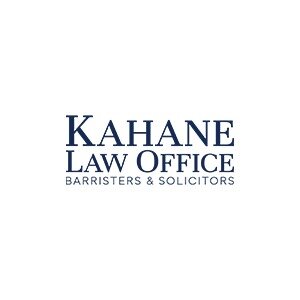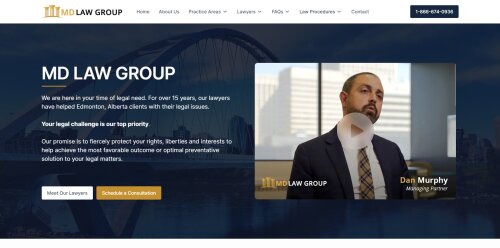Best Business Lawyers in Edmonton
Share your needs with us, get contacted by law firms.
Free. Takes 2 min.
List of the best lawyers in Edmonton, Canada
Canada Business Legal Articles
Browse our 1 legal article about Business in Canada written by expert lawyers.
- IP Strategy for Canadian Startups: Patent vs. Trade Secret
- Intellectual property (IP) in Canada is governed by a "first-to-file" system, meaning the first person to file a patent application generally has priority over earlier inventors who did not file. Patents offer a 20-year legal monopoly in exchange for public disclosure, while trade secrets provide indefinite protection as long as... Read more →
About Business Law in Edmonton, Canada
Business law in Edmonton, Canada, encompasses a broad range of legal areas affecting businesses, including formation and structure, corporate governance, mergers and acquisitions, tax law, contract law, bankruptcy, and intellectual property, among others. The legal landscape considers federal, provincial, and municipal laws, all of which play a significant role in regulating business operations. Navigating this intricate field proves daunting for many, thus necessitating legal guidance for seamless business operations.
Why You May Need a Lawyer
Business lawyers are crucial in providing advice on legal matters, such as navigating Edmonton's complex business regulations, contract drafting and review, dispute resolution, protection of intellectual property rights, and compliance with taxation obligations. Legal guidance prevents potential legal disputes, safeguards business interests, and facilitates smooth transactions and operations. Thus, whether you're starting a new business, negotiating contracts, or involved in a business dispute, a lawyer's services are indispensable.
Local Laws Overview
Edmonton's business laws are structured around federal, provincial, and municipal regulations. The Business Corporations Act governs business incorporation, while the Partnership Act deals with partnership businesses. Businesses must comply with the Alberta's Personal Information Protection Act regarding privacy and Alberta's Employment Standards Code for labor. Additionally, municipal by-laws regulate matters such as zoning and business licensing. Intellectual property, import-export regulations, and taxation laws are subject to federal legislation.
Frequently Asked Questions
1. Do I need a business license to operate in Edmonton?
Yes, businesses operating in Edmonton typically need a business license. However, the specific type can differ based on your business activity and location.
2. How do I protect my business’s intellectual property?
Engaging a business attorney can help you understand the appropriate means to protect your intellectual property via trademarks, patents, and copyrights, as per Canada's federal laws.
3. What laws govern employment in Edmonton?
The Alberta Employment Standards Code outlines minimum employment standards in Edmonton, addressing matters such as hours of work, minimum wage, leave entitlements, and termination procedures.
4. What tax obligations does my business face?
This depends on your business structure. Typically, businesses must adhere to federal corporate taxes, Goods and Services Tax (GST), and provincial taxes such as the Alberta Corporate Tax Act.
5. I wish to start a business in Edmonton. What are the initial legal steps I should take?
Initial steps include choosing a legal business structure, registering your business with federal and provincial bodies, obtaining necessary licenses, and adhering to zoning laws. Legal counsel can facilitate this process.
Additional Resources
The Government of Canada’s Canada Business Network, the Alberta Small Business Resources, and the Edmonton Chamber of Commerce provide tools, information, and advice to help businesses navigate Edmonton's complex business scene. The activities of the Alberta Securities Commission can be insightful for individuals seeking more information on securities and investment laws.
Next Steps
If you need legal assistance with your business in Edmonton, start by identifying reputable local business lawyers with a good understanding of Edmonton's specific legal landscape. Scheduling consultations will help you find a legal professional whom you feel comfortable working with and whose expertise aligns with your business needs. Remember to prepare your questions and necessary documents ahead of the meeting to maximize your consultation's value.
Lawzana helps you find the best lawyers and law firms in Edmonton through a curated and pre-screened list of qualified legal professionals. Our platform offers rankings and detailed profiles of attorneys and law firms, allowing you to compare based on practice areas, including Business, experience, and client feedback.
Each profile includes a description of the firm's areas of practice, client reviews, team members and partners, year of establishment, spoken languages, office locations, contact information, social media presence, and any published articles or resources. Most firms on our platform speak English and are experienced in both local and international legal matters.
Get a quote from top-rated law firms in Edmonton, Canada — quickly, securely, and without unnecessary hassle.
Disclaimer:
The information provided on this page is for general informational purposes only and does not constitute legal advice. While we strive to ensure the accuracy and relevance of the content, legal information may change over time, and interpretations of the law can vary. You should always consult with a qualified legal professional for advice specific to your situation.
We disclaim all liability for actions taken or not taken based on the content of this page. If you believe any information is incorrect or outdated, please contact us, and we will review and update it where appropriate.
Browse business law firms by service in Edmonton, Canada
Edmonton, Canada Attorneys in related practice areas.












